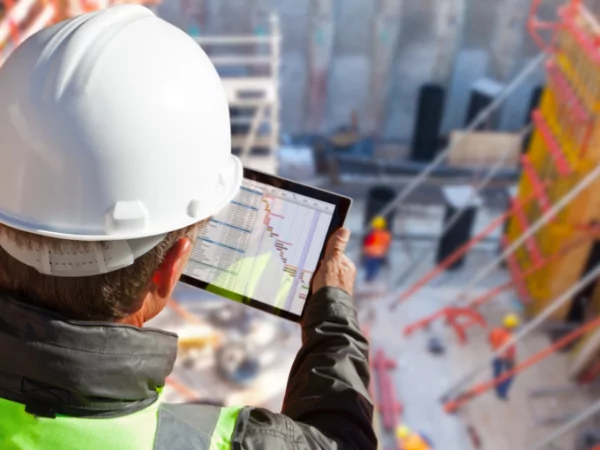5 areas of construction where technology can show dramatic impact
The role of technology is to simplify working in everyday life. And sure enough, organizations are reaping the benefits from massive digital transformation initiatives underway currently. The construction sector has also seen growing interest in the potential of new technology innovations to disrupt the sector.
The construction industry is fragmented and traditional. Construction industry investments in technology often trail what companies in other industries spend on technology.
Automation in construction technology can lead to several benefits for the construction industry. Some research suggests that as much as 49% of construction tasks could be automated. Be it worker safety or faster completion of work itself, construction technology may have a huge role to play in delivering safer and better construction environments.
Adopting construction technology is today a necessity rather than a choice for construction companies looking to stay relevant and competitive. Many companies have started to take note of the edge that can come from adopting innovative technology for construction.
Here are some ways where construction technology can be a game-changer for the industry, delivering better outcomes, and driving transformational growth:
Improving productivity with software
One area where construction companies struggle commonly is how to constantly ensure that the productivity levels keep improving. With construction technology, this can be addressed. Using mobile apps and cloud technology can foster new levels of collaboration between workers and project managers. Cloud-based software solutions and mobile apps enable on-site workers to update progress, submit time cards, expense reports, ask for information on the go, without wasting too much time in manual paperwork. Using cloud technology helps in streamlining routine work and in turn improving the overall productivity of the team.
Analytics for better decision making
With technology, the construction industry can now closely track and monitor the progress of their construction projects with all the relevant data at their disposal. Data-focused solutions not only help in capturing critical business data but also uncover the hidden patterns, which companies can leverage to predict future outcomes and take timely decisions accordingly. Predictive insights can help construction companies identify potential problem areas and be ready with the solutions, rather than act at the last hour. Connected technology like sensors can be used to track material inventory on the site for greater control and visibility and to reduce downtime by ensuring timely replenishments. Drones and high definition cameras can help to capture data on everyday progress and compare with the schedule and BIM models to track the deviations and address them in time. Analytics-based tracking helps in enhancing transparency and building more accountability into the system.
Augmenting worker safety
A very critical aspect of the construction industry is to ensure the safety of its labor workforce. This is critically important given that 1 in 5 workplace fatalities in the USA occurs on construction sites. Dealing with heavy machinery and laborious processes delivered at risk-prone locations creates a more dangerous work environment. Especially emerging tech like Virtual Reality and Augmented Reality can be implemented at construction sites that will give workers a better idea of what is involved and train them better to achieve the desired output. Safety checklist and use of wearable technology can help in mitigating the risks faced by the construction workers. For example, using sensors at certain important areas can alert workers of any threat to their safety, which helps them act in time and make the right decision on the site. Or a project manager can simply use VR tools to exchange information on on-site progress. The use of drones is also a growing trend in the construction industry to provide more comprehensive visual information about the site for better safety.
Leveraging BIM technology with other technology
Building Information Modeling or BIM is no longer new. BIM offers a collaborative platform to all the stakeholders involved in delivering a construction project. This 3D design software works as a real-time tool where all the concerned people can collaborate and communicate based on a shared model. This creates an organized effort and eliminates clashes at the design stage itself. The sheer detail of the BIM model holds forth great promise when tied into other emerging technologies. For instance, immersive VR technology along with BIM provides a great scope for real-time visual collaboration and learning. BIM can also play a powerful enabling role in offsite construction, modular construction, and 3-D printing.
Efficient project planning
BIM can also be tied synergistically to software solutions like construction ERP solutions and Project Management solutions for a continuous impact on the project. Using BIM tools, integrating AI and ML tech enables construction companies to get deep insights into the project. Companies can plan their project better – in terms of manpower, in terms of inventory, in terms of budgeting and estimation, in terms of execution and safety. Using technology to aid projects results in more sustainable construction as companies not only save precious man-hours spent in doing repetitive tasks but with better planning of resources companies can also control expenditure and eliminate safety hazards. All in all, technology makes way for an efficient and productive project plan.
Construction companies are slowly but surely understanding how technology can make a huge impact in their way of working. Many companies have already moved ahead with their technology investments and are already seeing benefits.
Technology in the construction space is advancing every day and adopting emerging tech will help companies retain their competitive edge. Whether it’s team collaboration, worker safety, sharing critical information, or tracking project progress, technology can help in all areas to deliver a transformation in the construction landscape.

